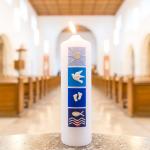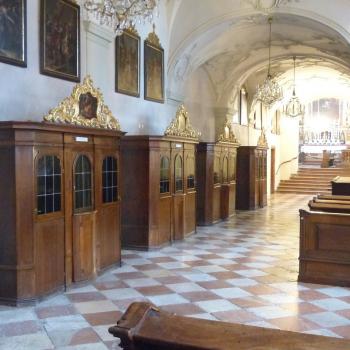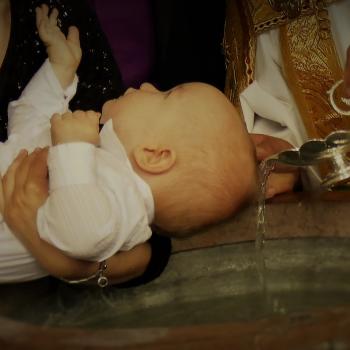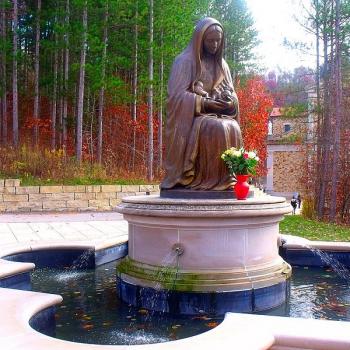It appears that Part 1 of this post resonated with a LOT of people! I have heard so many stories over the past few days in response regarding parishes that have instituted similar ridiculous requirements prior to baptism, and the heartbreak and frustration that has caused many, many Catholic families.
I wanted to add some clarifications based on some of the feedback I received.
One commenter brought CCC 1256 to my attention:
1256 The ordinary ministers of Baptism are the bishop and priest and, in the Latin Church, also the deacon. In case of necessity, anyone, even a non-baptized person, with the required intention, can baptize, by using the Trinitarian baptismal formula. The intention required is to will to do what the Church does when she baptizes. The Church finds the reason for this possibility in the universal saving will of God and the necessity of Baptism for salvation.
Notice that it says “In the case of necessity,” not “in the case of danger of death.” The Code of Canon Law states that children “in danger of death” are to be baptized “without delay,” but I’m not sure if it’s ever been defined what what “necessity” would entail.
If a parent is truly anxious that his or her child needs baptism sooner than the bureaucracy of his or her church is willing to provide it, a baptism could in theory be performed by the parents in their home. The subsequent Church baptism would be a conditional baptism.
Please note that I am not encouraging this as a standard practice in every case, nor am I encouraging people to circumvent their church’s established protocol for requesting baptism. It’s more of an option to consider if the bureaucracy of their particular parish is such that baptism is being unreasonably delayed and/or parents have genuine fear or anxiety about the state of their baby’s soul, due to potential SIDS risk or similar concern, that doesn’t rise to the level of “immediate danger of death” — which seems to be the only criteria many parishes use for immediate baptism, given that phrase is in canon law.
Also, while reading the CCC excerpt above, I noticed this line in CCC 1261:
1261 As regards children who have died without Baptism, the Church can only entrust them to the mercy of God, as she does in her funeral rites for them. Indeed, the great mercy of God who desires that all men should be saved, and Jesus’ tenderness toward children which caused him to say: “Let the children come to me, do not hinder them,”64 allow us to hope that there is a way of salvation for children who have died without Baptism. All the more urgent is the Church’s call not to prevent little children coming to Christ through the gift of holy Baptism.
Given that line and what the Code of Canon Law says (more on that below), it’s more frustrating to me than ever that church bureaucracy and policies will allow often MONTHS to pass before children are baptized.
One thing I wanted to mention: when my fifth baby was born, he had a birth defect that required surgery at six weeks of age. Soon after his birth, I called my parish and explained that my baby would be having surgery in less than two months, and that I felt it was important for him to receive baptism before the surgery.
They agreed, and because his baptism was considered an “emergency baptism,” we had the deacon come to our home and do the required baptism class (since it had, sigh, been over three years since the last one). My son ended up being baptized within the same month that he was born!
Also for the record, we were able to arrange a private baptism for babies three and four at my parish because at the time I had a friend (godfather for babies #4 and #6, as a matter of fact) who worked in the parish office and was able to streamline things for us. They were much different experiences than the one I had with my sixth baby.
A Former DRE Weighs In
In Part 1, I mentioned that I’d provide input from a former Director of Religious Education. Jessica M. is a Catholic wife and mother who, in addition to being a former parish DRE, was also a Dominican Sister for six years. You can find her blog at https://catholiccustoms.wordpress.com.
I asked Jessica,
What do you think of parishes placing onerous requirements on parents seeking baptism for their children? As a hypothetical example, let’s say a parish required three mandatory parent classes before scheduling baptism. What would your response be?
She replied,
If a 3-session class is required, this causes undue hardship on families that may just barely be on the fence about baptism. Many families I met with during my time as a Pastoral Associate were merely doing it for the sake of tradition. They were Catholic, yes, but often times had very little catechesis; they wanted to have their baby baptized because that is what was expected of Catholic parents.
To require a 3-session class of these new parents would have caused many of them to turn away from bringing their child to the waters of baptism. I also met many families that, through one obstacle or another, never got around to baptizing their child until many, MANY years later.
It is a direct contradiction to the requirements of the current Code of Canon Law. When I worked at the church, I was alarmed by the lack of knowledge of Canon Law by those who should know it (at least know of it enough to look things up). Baptism was one such battleground, so to speak. I found that offering baptism only during certain months of the year prevented many parents from fulfilling this, even though they desired it.
Eventually I was able to offer a suggestion that if a family desired it (and was properly prepared), they could request a baptism apart from he usual time. It took a lot of effort, and the exception was rarely made, but it put the phrase from Canon Law into their minds.
Also, I changed the baptism prep program so that I had a team of catechists, who would meet one-on-one with a family (after I spoke to them on the phone either before or after baby was born), and met with them to catechize them about baptism. This was a one-time meeting…and we told them it lasted up to 2 hours. Usually it was done in 1 hour, but there were cases of such poorly catechized parents that 2 hour classes did happen.
What would you say to someone who argued that anyone who wasn’t willing to attend multiple classes shouldn’t have their child baptized Catholic anyway, because that meant they weren’t committed to raising their child in the faith?
I would say that we do not know the inner workings of the hearts of the parents and godparents. It is not up to us to discern that. Our job is to ask them if they desire to raise their child Catholic, and believe their answer! Then, give them the tools they need, especially in the years to come.
There is no canonical requirement for a 3-part series about baptism. If the parents say they will raise the child Catholic, we must trust them and accompany them on the journey. If, however, the parents make known that they only want baptism because of family custom (no ties to the faith at all… just superstition, or what have you), then there is a great need to help them understand why baptism is important, and what responsibility it places on the parents. Also, if you’re going to require three classes, let the parents do them while they are pregnant still. [Addition from JoAnna: or, at the very least, let them do it online!]
Going to Canon Law again, I would remind them that it says the following (notes in parentheses are my own):
Can. 868 §1. For an infant to be baptized licitly:
1/ the parents or at least one of them or the person who legitimately takes their place must consent; (okay, so this is taken care of by the parents coming out and asking for baptism)
2/ there must be a founded hope that the infant will be brought up in the Catholic religion; if such hope is altogether lacking, the baptism is to be delayed according to the prescripts of particular law after the parents have been advised about the reason. (It does not say anything about totally refusing baptism, but of informing the parents as to why the baptism is to be delayed…and working through the issue).
From my experience, any time a representative of the Catholic church (be it a deacon, priest or lay person) put up a roadblock to baptism without showing a bridge, the family turned away. At times, they even left the church, and went to some protestant denomination instead. It was heartbreaking.
That is heartbreaking. And so unnecessary.
Stay tuned for Part 3 of this series, where I’ll talk about practical suggestions I feel parishes could implement to simplify and streamline the process of baptism.
















